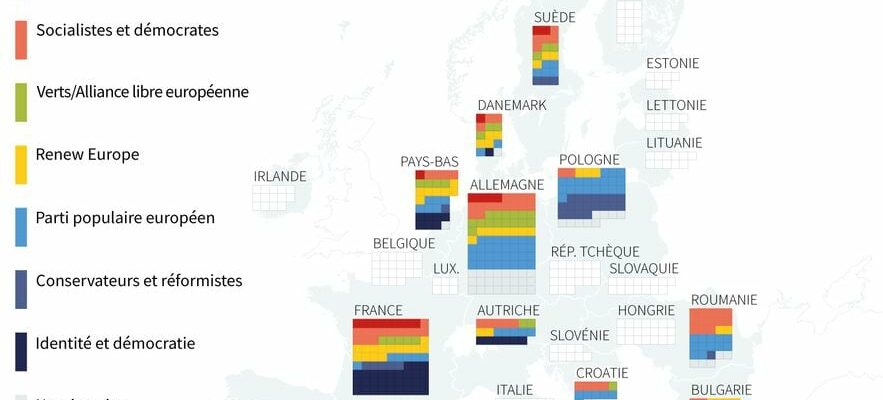The European elections across Europe delivered their verdict this Sunday, June 9. If France was obviously marked by the thunderbolt of the dissolution of the National Assembly, announced by Emmanuel Macron, other European countries also saw surprises unfold. Tour of Europe estimates, country by country.
Germany. The government coalition of Chancellor Olaf Scholz suffered a bitter setback, with its three parties each arriving behind the conservative opposition but also the far right, according to polls carried out for public television channels. The Social Democrats of head of government Olaf Scholz obtained 14% of the vote, the worst score ever recorded by this party for this election. In 2019, the SPD had already suffered a historic defeat with 15.8% of the vote. It comes behind the far-right party AfD, in second position with between 16 and 16.5% of the vote, according to surveys carried out at the exit of the polling stations for ARD and ZDF.
The conservatives (CDU and CSU), the party of the President of the European Commission, Ursula von der Leyen, came very far in the lead with 29.5-30% (compared to 28.9% in 2019).
Map showing the political groups of MEPs elected in 2024 country by country, with estimates as of June 9 at 10 p.m.
© / AFP
Austria. The far-right FPÖ party is credited with 27% of the votes, leading the poll. The Dutch, first to vote on Thursday, confirmed a rise in Geert Wilders’ far-right party – in second place behind the social-democrat/ecologist coalition, according to estimates.
Spain. The conservatives came slightly ahead of the European elections in Spain, obtaining 32.4% of the vote (21 to 23 seats) ahead of the Socialist Party of Prime Minister Pedro Sánchez, which obtained 30.2% of the vote (20 to 22 seats). ), according to a survey published when the polling stations closed. On the far right, the Vox party would win 6 or 7 seats (10.4% of the vote) while a new formation called “The party is over” (Se acabo la fiesta) would enter the European Parliament. with 2 to 3 seats (3.9% of the votes).
Poland. Polish Prime Minister Donald Tusk’s centrist pro-European party, the Civic Coalition (KO), emerged victorious in Sunday’s European elections, with 38.2% of the vote, which should earn it 21 MEPs, according to results from an exit poll from the polling stations published Sunday evening. Coming second, the populist nationalist Law and Justice (PiS) party, which had remained in power in Poland for eight years until the October legislative elections, was supported by 33.9% of voters and would send 19 representatives to Brussels .
The far right of Konfederacja (Confederation), very eurosceptic of the European Union, but which does not plan to request its dissolution, can congratulate itself on a success with 11.9% of voters (six MEPs), according to the survey carried out by the Ipsos institute.
Slovakia. The Slovak opposition liberal party created a surprise by coming out on top against the Smer-SD party of Prime Minister Robert Fico with pro-Putin leanings, who was seriously injured recently in an attack.
Portugal. The camp of the new moderate right-wing Portuguese government and the socialist opposition are neck and neck, around 30%, in the European elections this Sunday. The far right, for its part, would have had a lower score than in the legislative elections in March, according to several exit polls.
